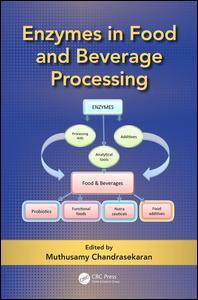Description
Enzymes in Food and Beverage Processing
Language: English
Subject for Enzymes in Food and Beverage Processing:
Keywords
Glucose Oxidase; Glucose Syrup; Applications of food enzymes; Polyphenol Oxidase; Enzyme processing of food; Immobilized Enzyme; Enzymes in beverage processing; Enzyme Engineering; Enzymes in food processing; Glucose Isomerases; Food and beverage processing; Bioactive Peptides; Food enzymes; Beverage Processing Industries; Cocoa Butter Equivalent; High Fructose Syrup; Beverage Processing; Enzymatic Browning; Pectin Lyase; Date Syrup; Acetolactate Decarboxylase; Fruit Juices; Extraction Yield; Enzyme Technologies; Enzyme Application; HFCS; SSF; Cyclodextrin Glycosyltransferase; Seafood Processing; De Novo Design
Publication date: 10-2015
· 17.1x24.1 cm · Hardback
Publication date: 07-2018
· 17.8x25.4 cm · Paperback
Description
/li>Contents
/li>Readership
/li>Biography
/li>
Biotechnology, particularly eco-friendly enzyme technologies, has immense potential for the augmentation of diverse food products utilizing vast biodiversity, resolving environmental problems owing to waste disposal from food and beverage industries. In addition to introducing the basic concepts and fundamental principles of enzymes, Enzymes in Food and Beverage Processing covers development of novel enzymes with desired properties and functions for use in food industries and use of enzymes as analytical tools for monitoring in food and beverage processing. It also details the application of enzymes in different food and beverage industries, recent advances in enzymology, functional foods, probiotics, and food additives.
The book examines the scope, emerging enzyme technologies, and applications of enzymes in processing of various foods and beverages and in developing novel food products. It covers emerging enzyme technologies and enzyme engineering techniques for improved and enhanced performance of enzymes in food and beverage processing. The book discusses the scope for deriving new range of food products such as functional foods, nutraceuticals, and probiotics using enzymes as well as the scope for application of enzyme inhibitors and enzyme mediated biotransformation?s for improved enzyme processing of food and beverages.
In the context of growing environmental problems and need for sustainable use of available natural resources, there is an increased need to implement valorization strategy in food and beverage processing industries which generates voluminous byproducts and wastes. Hence, the book also examines the use of enzymes in valorization of food processing wastes, besides the research gaps and future trends in the field that promote applications of enzymes. It examines the use of enzymes in food and beverage processing from the various food industries point of view and enables a deep understanding of the latest developments in modern food technologies and biotechnologies that you can use to meet ever-increasing consumer demands.
Enzymes: Basics and Development of novel biocatalysts. Applications of Enzymes in food and beverage industries. Advances in food grade enzyme biotechnology. Future trends and prospects.
Professor Muthusamy Chandrasekaran is a distinguished scientist and a Teacher who has made significant contributions in the field of marine microbiology and biotechnology. Born on April 10th 1956 Professor Chandrasekaran had his B.Sc Degree in Zoology from University of Madras, India, M.Sc degree in Marine biology from Annamalai University, India and Ph.D degree in Microbiology (food microbiology) from Cochin University of Science and Technology, India, He did his post doctoral research in genetic engineering of bacteria for waste water treatment in Hiroshima University, Japan. His major area of research interest is harnessing marine microorganisms for novel enzymes, bioactive molecules, microbial and enzyme technologies for enzyme production and waste management.




